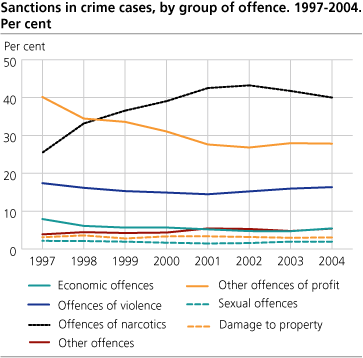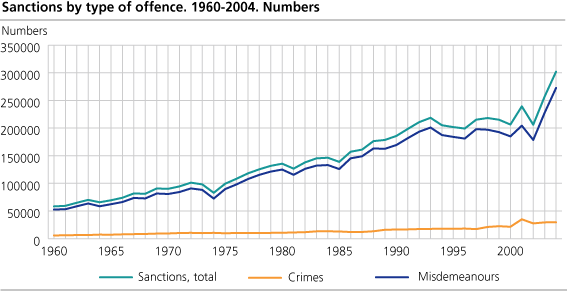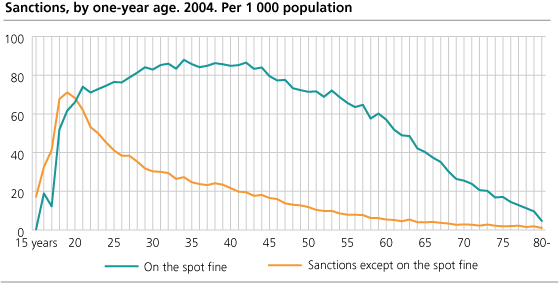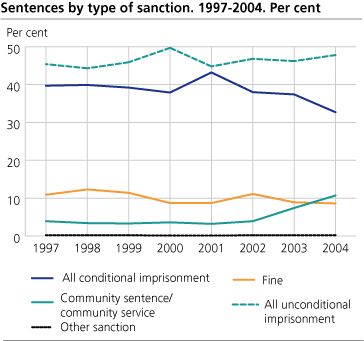Content
Published:
This is an archived release.
Increase in new type of sanctions
Never before have so many sanctions been registered in Norway as in 2004 - 18 per cent more than in the previous record year of 2003. The change is due to the major increase in the number of on the spot speeding fines, based on automatic traffic controls. The more serious sanctions have been relatively stable for the last two years, and these are most often sentenced to young people aged between 18 and 24.
In 2004, 261 000 persons were sentenced to 302 000 sanctions. This corresponds to 7 per cent of the population above the age of consent being sentenced once or more throughout the year, compared with 6 per cent in 2003.
The increase in sanctions from 2003 to 2004 is due to the major increase in on the spot speeding fines, based on automatic traffic controls - which increased by 60 per cent. At the same time, on the spot speeding fines based on traditional traffic controls decreased by 5 per cent. However, the number of sanctions for crime is at the same level as 2003.
Most sanctions for narcotic crimes...
The extent of sanctions for crimes has been stable compared to 2003, but over time there has been an increase in all groups of crime. Despite the decrease of 4 per cent in the number of sanctions against narcotic offences, this group of offence has had the largest increase in the last eight-year period. This has contributed to a significant change in the reasons for punishment: from constituting 25 per cent in 1997, narcotic crimes are now the main offence in 40 per cent of crime cases. Correspondingly, traditional crimes for profit changed from constituting 40 per cent in 1997, to now being the main offence in 28 per cent of crime cases.
| Sanctions in crime cases, by group of offence. 1997-2004 |
| 1997 | 1998 | 1999 | 2000 | 2001 | 2002 | 2003 | 2004 | ||||||||||||||||||||||||||||||||
|---|---|---|---|---|---|---|---|---|---|---|---|---|---|---|---|---|---|---|---|---|---|---|---|---|---|---|---|---|---|---|---|---|---|---|---|---|---|---|---|
| Total | 17 192 | 21 128 | 22 465 | 21 444 | 34 962 | 27 513 | 29 380 | 29 529 | |||||||||||||||||||||||||||||||
| Economic offences | 1 360 | 1 289 | 1 269 | 1 215 | 1 816 | 1 299 | 1 382 | 1 606 | |||||||||||||||||||||||||||||||
| Other offences of profit | 6 902 | 7 281 | 7 544 | 6 658 | 9 652 | 7 376 | 8 213 | 8 217 | |||||||||||||||||||||||||||||||
| Offences of violence | 2 989 | 3 414 | 3 435 | 3 195 | 5 055 | 4 186 | 4 687 | 4 826 | |||||||||||||||||||||||||||||||
| Sexual offences | 369 | 443 | 433 | 356 | 510 | 429 | 571 | 570 | |||||||||||||||||||||||||||||||
| Offences of narcotics | 4 374 | 7 004 | 8 212 | 8 374 | 14 861 | 11 894 | 12 265 | 11 815 | |||||||||||||||||||||||||||||||
| Damage to property | 534 | 757 | 625 | 715 | 1 170 | 873 | 867 | 905 | |||||||||||||||||||||||||||||||
| Environment offences | 12 | 5 | 16 | 13 | 14 | 5 | 7 | 12 | |||||||||||||||||||||||||||||||
| Other offences | 652 | 935 | 931 | 918 | 1 884 | 1 451 | 1 388 | 1 578 | |||||||||||||||||||||||||||||||
More then nine out of ten sanctions are a fine
The dominant sanction is a fine. 93 per cent of all sanctions in 2004 were fines, including on the spot fines. This is a type of sanction that is not settled by sentence but is issued by the police or the public prosecution.
Less prison sentences
20 400 sentences were passed in the law courts in 2004, a decrease of 9 per cent compared to 2003. The number of sentences has been relatively stable, but with a slightly higher level since the mid 1980s. In the ten-year period 1985-1994, the courts issued an average 19 200 sanctions each year, whilst the corresponding figure in the last ten-year period was 20 100.
Unconditional prison sentences accounted for 47 per cent of all sentences in 2004. The number of unconditional prison sentences decreased by 5 per cent, while the average length of imprisonment increased slightly compared to 2003. Among the unconditional sentences that were passed in 2004, 68 per cent were for less than three months, 21 per cent were for between three months and a year, and 11 per cent were for more than a year.
| Table 32 (On the spot fines for traffic misdemeanours and ticket fines based on automatic traffic control, by age of the person and scene of crime (county). 2004. Numbers and per 1 000 population) is corrected 20 September 2007. |
|
New special sanctions
The new special sanctions of preventive detention, compulsory mental health care and compulsory care came into force on 1 January 2002 and had a retrospective effect whereby security detention sentences can be reopened and converted to one of the new special sanctions. The special sanctions replaced security detention as a special penal measure. For the years 2002 and 2003, it was not possible to identify these sanctions due to the registration system. In 2005, Statistics Norway, in cooperation with The National Criminal Investigation Service, identified these sanctions. Thus the statistics for 2002 and 2003 have been revised. |
Contact
-
Sigmund Book Mohn
E-mail: sigmund.mohn@ssb.no
tel.: (+47) 94 32 77 22
-
Reid Jone Stene
E-mail: reid.jone.stene@ssb.no
tel.: (+47) 99 02 22 01




